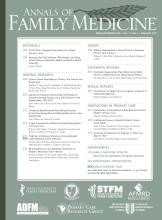Abstract
PURPOSE We wanted to identify published randomized trials of interventions to alter the interaction between patients and practitioners, develop taxonomies of the interventions and outcomes, and assess the evidence that such interventions improve patients’ health and well-being.
METHODS Undertaking a systematic review of randomized trials, we sought trials in primary and secondary care with health-related outcomes, which we found by searching MEDLINE, HealthSTAR, and PsycINFO bibliographic databases through 1999. We also completed one round of manual citation searching.
RESULTS Thirty-five trials were included. Most were set in primary care in North America. Trials were heterogeneous in populations, settings, interventions, and measures. Interventions frequently combined several poorly described elements. Explicit theoretical underpinning was rare, and only one study linked intervention through process to outcome measures. Health outcomes were rarely measured objectively (6 of 35), and only 4 trials with health outcomes met predefined quality criteria.
Interventions frequently altered the process of interactions (significantly in 73%, 22 of 30 trials). Principal outcomes favored the intervention group in 74% of trials (26 of 35), reaching statistical significance in 14 (40%). Positive effects on health outcomes achieved statistical significance in 44% of trials (11 of 25); negative effects were uncommon (5 of 25, 20%). Simple approaches to increasing the participation of patients in the clinical encounter, such as providing practitioners with a note from patients about their concerns beforehand, showed promise, as did more complex programs providing specific information about disease and attention to emotion. Apparently similar interventions varied in effectiveness across studies.
CONCLUSIONS Successful interactions between patients and their practitioners lie at the heart of medicine, yet there are few rigorous trials of well-specified interventions to inform best practice. Trial evidence suggests that a range of approaches can achieve changes in this interaction, and some show promise in improving patients’ health. To advance knowledge further, we need to replicate promising studies using rigorous methods. These should include explicit theoretical frameworks designed to link effects on key communication and interaction characteristics through to effects on health outcomes.
- Consultation
- office visits
- patient-centered care
- outcome assessment (health care)
- randomized trial
- systematic review
Footnotes
-
Conflict of interest: none reported
-
Funding support: Financial support was provided by NHS Executive Eastern.
A version of this paper was presented before the North American Primary Care Research Group, November 2001; and before the Association of University Departments of General Practice, July 2000.
- Received for publication July 23, 2003.
- Revision received January 8, 2004.
- Accepted for publication January 26, 2004.
- © 2004 Annals of Family Medicine, Inc.







